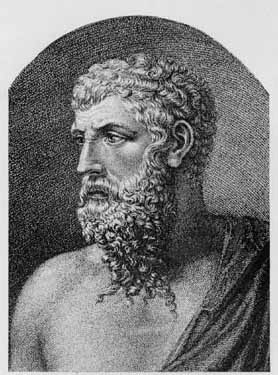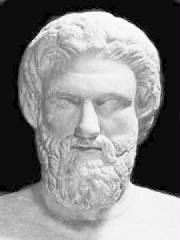|

Most of what is known about Aristophanes is through his surviving plays. Aristophanes lived in Athens, Greece. The dates of
his birth and death are unknown and have been estimated to be from 456 B.C. to 385 B.C. based on when his plays were written.
It is not known where he was born and the only evidence we have are claims by cities that say that he is their native son.
Many claims include that he was not from Athens and later moved there, but none of these claims have been proven true. His
work demonstrates that he was very well educated and probably from a wealthy family.
The writer and poet of nearly forty known plays, Aristophanes took great pride in using his skills as a poet and writer
to mock the political life of Athens. The Peloponnesian War was the major event of Athens during his life and Aristophanes
wrote many plays that took an anti- war stance. He also wrote comic plays which mocked the decline of Athenian society. One
play even took a direct aim at Socrates. Others made fun of the tragic playwright Euripides and the historian Herodotus.
This did not mean, however, that Aristophanes disliked Athens or its people. "...like a true comic poet, he could
be witty at the expense even of his friends, and, it might almost be said, of himself" (Bates). Like most comedians,
Aristophanes could find a joke in everything and he sought to share his jokes with the people of Athens.
Not everything, however, was comedy for Aristophanes. His work reflected the sadness of the Peloponnesian War. Some of
his plays show his grief for the Athenians who had died by the hands of the Spartans. He used humor to lesson the grief of
Athens.
After his works about the Peloponnesian War, Aristophanes did not write comedies on politics for nineteen years. Some
believe that he could not openly insult Athens in a time of such political strain and unhappiness in the people. He wrote
a few more plays after this, none of which were as directly insulting, and died three years later.
Aristophanes has left behind a large legacy. He inspired many more comic writers of that era, including his three sons.
Overall in his time, Aristophanes was viewed as a very humorous man and was probably often forgiven for his insults because
it was his job to write such satire. He did know at times when to stop when things got really hard in Athens. It was customary
in Athens for the performance of plays to be a large event where nearly everyone attended. There were competitions in which
Aristophanes took the top prize for his work.
Aristophanes is the only "Old Comic" writer of Greece who has complete works that are still around today. Many
comic writers have used his styles as an example, including, some say, Shakespeare. He is considered a genius and his writing
is intelligent and funny even to modern audiences. Aristophanes shows that in his age, like today, everyone could use a good
laugh at something that was serious or tragic.
 To learn more about Aristophanes's life click hear.
|

